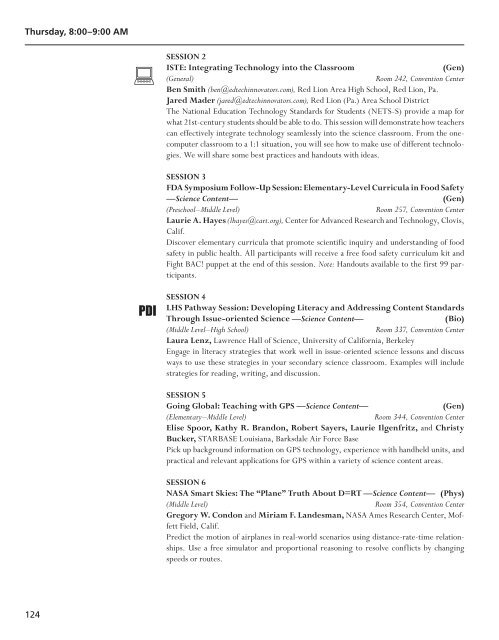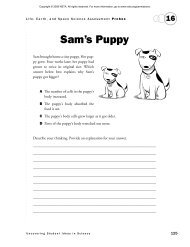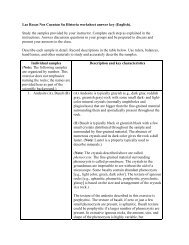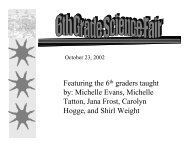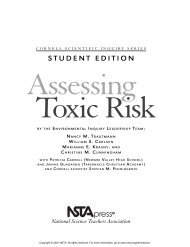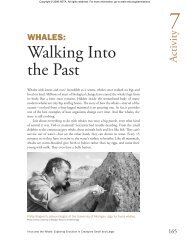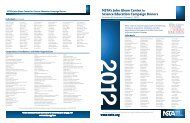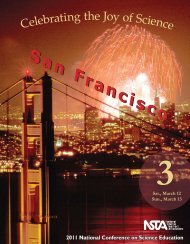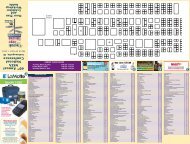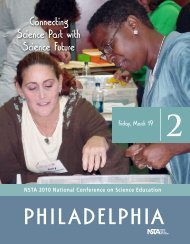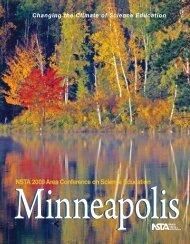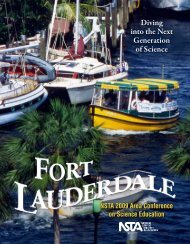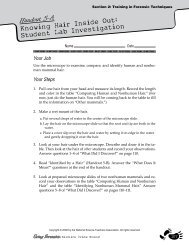New Orleans Program, Vol. 1 - National Science Teachers Association
New Orleans Program, Vol. 1 - National Science Teachers Association
New Orleans Program, Vol. 1 - National Science Teachers Association
Create successful ePaper yourself
Turn your PDF publications into a flip-book with our unique Google optimized e-Paper software.
Thursday, 8:00–9:00 AM<br />
124<br />
�<br />
PDI<br />
SESSION 2<br />
ISTE: Integrating Technology into the Classroom (Gen)<br />
(General) Room 242, Convention Center<br />
Ben Smith (ben@edtechinnovators.com), Red Lion Area High School, Red Lion, Pa.<br />
Jared Mader (jared@edtechinnovators.com), Red Lion (Pa.) Area School District<br />
The <strong>National</strong> Education Technology Standards for Students (NETS-S) provide a map for<br />
what 21st-century students should be able to do. This session will demonstrate how teachers<br />
can effectively integrate technology seamlessly into the science classroom. From the onecomputer<br />
classroom to a 1:1 situation, you will see how to make use of different technologies.<br />
We will share some best practices and handouts with ideas.<br />
SESSION 3<br />
FDA Symposium Follow-Up Session: Elementary-Level Curricula in Food Safety<br />
—<strong>Science</strong> Content— (Gen)<br />
(Preschool–Middle Level) Room 257, Convention Center<br />
Laurie A. Hayes (lhayes@cart.org), Center for Advanced Research and Technology, Clovis,<br />
Calif.<br />
Discover elementary curricula that promote scientific inquiry and understanding of food<br />
safety in public health. All participants will receive a free food safety curriculum kit and<br />
Fight BAC! puppet at the end of this session. Note: Handouts available to the first 99 participants.<br />
SESSION 4<br />
LHS Pathway Session: Developing Literacy and Addressing Content Standards<br />
Through Issue-oriented <strong>Science</strong> —<strong>Science</strong> Content— (Bio)<br />
(Middle Level–High School) Room 337, Convention Center<br />
Laura Lenz, Lawrence Hall of <strong>Science</strong>, University of California, Berkeley<br />
Engage in literacy strategies that work well in issue-oriented science lessons and discuss<br />
ways to use these strategies in your secondary science classroom. Examples will include<br />
strategies for reading, writing, and discussion.<br />
SESSION 5<br />
Going Global: Teaching with GPS —<strong>Science</strong> Content— (Gen)<br />
(Elementary–Middle Level) Room 344, Convention Center<br />
Elise Spoor, Kathy R. Brandon, Robert Sayers, Laurie Ilgenfritz, and Christy<br />
Bucker, STARBASE Louisiana, Barksdale Air Force Base<br />
Pick up background information on GPS technology, experience with handheld units, and<br />
practical and relevant applications for GPS within a variety of science content areas.<br />
SESSION 6<br />
NASA Smart Skies: The “Plane” Truth About D=RT —<strong>Science</strong> Content— (Phys)<br />
(Middle Level) Room 354, Convention Center<br />
Gregory W. Condon and Miriam F. Landesman, NASA Ames Research Center, Moffett<br />
Field, Calif.<br />
Predict the motion of airplanes in real-world scenarios using distance-rate-time relationships.<br />
Use a free simulator and proportional reasoning to resolve conflicts by changing<br />
speeds or routes.


